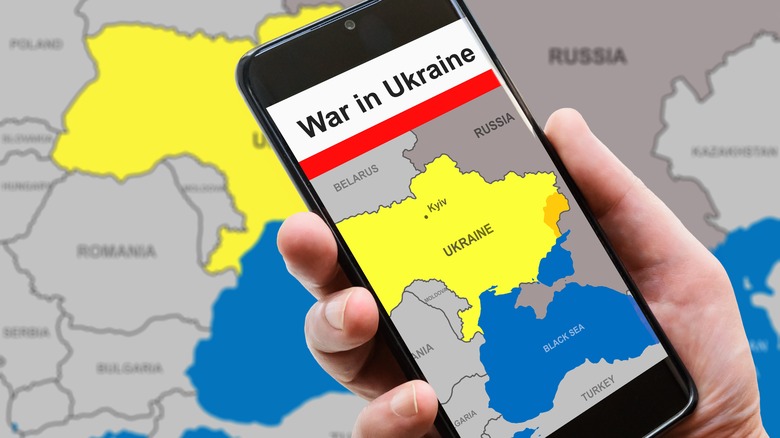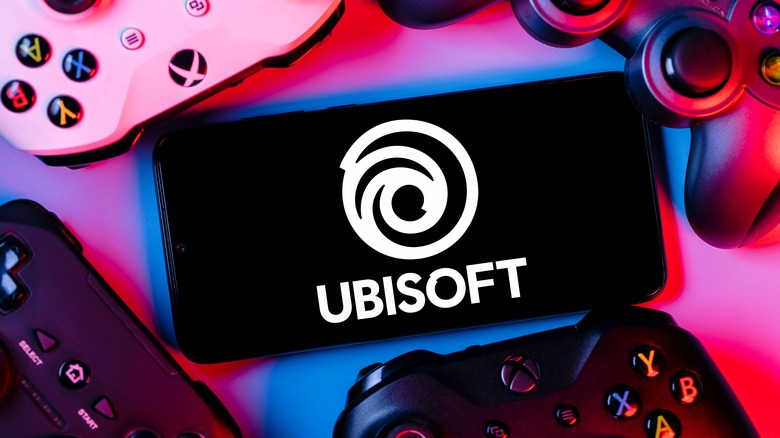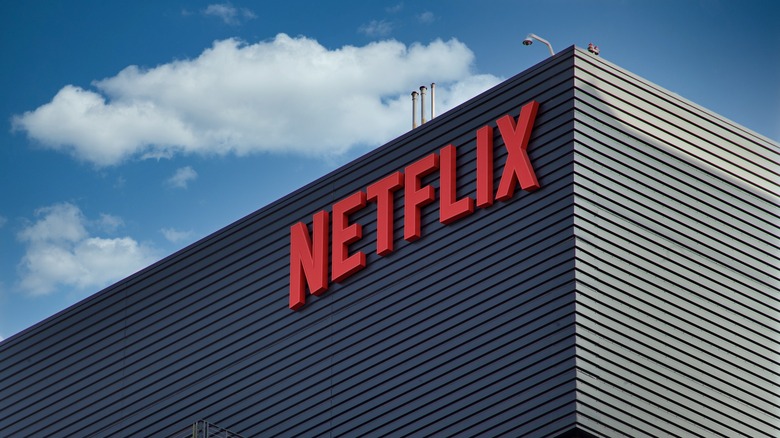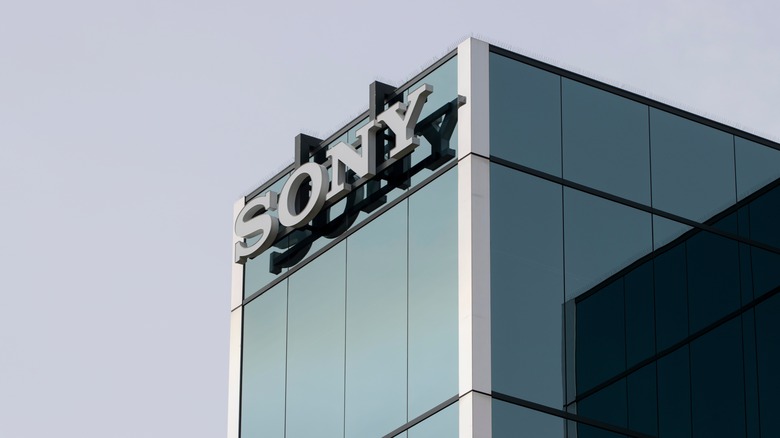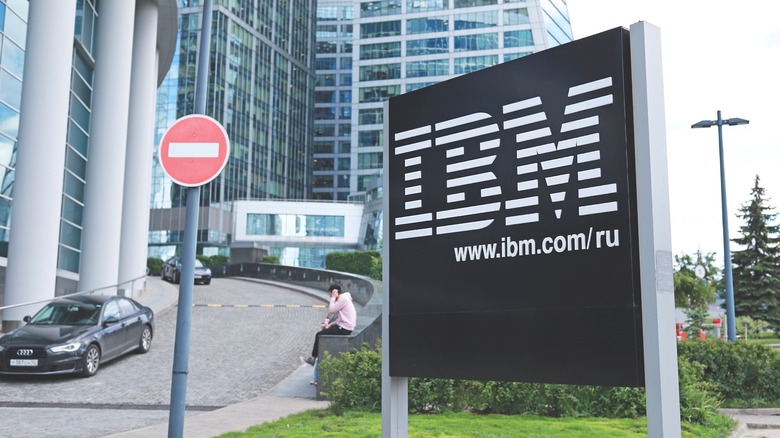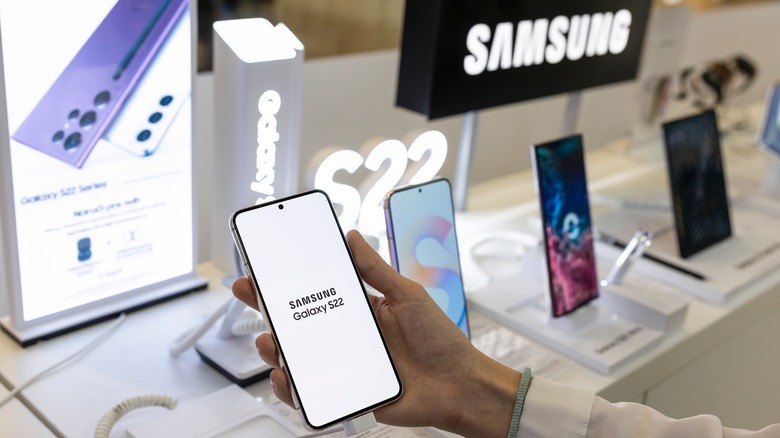Tech Companies That Bailed On Russia After The Ukraine Invasion
Russia's invasion of Ukraine in February 2022 saw the country hit with sanctions from Europe, the U.S., and its allies, with restrictions placed on businesses operating within the territory and within neighboring Belarus. One of the biggest changes Russians have seen in the wake of these sanctions is their access to technology shrinking, as global tech companies have scrambled to pull out of the country to comply with the new rules. Everything from smartphones to payment processing has been affected, with domestic Russian companies hastily attempting to patch up the mess left by the exit of these tech giants.
With the war showing no signs of ending at the time of writing, it's unlikely that any of the tech companies that pulled out will be able to return to the Russian market in the near future. The short-term disruption for Russian citizens will be significant, but if the sanctions continue over a longer period, the country's citizens will also be left behind when newer technologies are made available to the rest of the world. This kind of isolation brings Russia back to the days of the Soviet Union and risks doing irreparable damage to the country's economy and its ability to compete in an increasingly globalized tech world. Some of these companies have only suspended their operations in Russia with the possibility of returning after sanctions are lifted, but others have already completed a permanent withdrawal from the country with no plans to re-enter for the foreseeable future.
Ericsson and Nokia
Telecom giants Ericsson and Nokia are responsible for making a significant portion of Russia's cell network infrastructure, with Reuters reporting that close to 50% of base stations in the country were made by one of the two firms. These stations and the surrounding infrastructure rely on frequent software updates to ensure all parts of the network run smoothly. After receiving exemptions from EU sanctions to keep the network running until the end of 2022, both companies have now pulled out of Russia altogether. Nokia's CEO claimed in December, "Our exit will be complete. We are not going to deliver anything to Russia."
The country is now bracing for a gradual breakdown of the cellular network, as the lack of updates and repair means that once something breaks, it won't be possible to fix it. This could lead to slower download speeds, patchy coverage, or in some areas, complete outages that could last indefinitely. Russia's digital ministry has reportedly said that the exit of Ericsson and Nokia will have no impact on day-to-day communications, as Russian tech companies have already begun to replace the infrastructure with domestically-made equipment. However, this potentially leaves the cell network vulnerable to attacks and able to be weaponized by Ukrainian forces.
Ubisoft
Game publisher Ubisoft has been one of the companies most directly impacted by the war in Ukraine, as one of its major development studios is based in Kyiv. The studio's webpage states that the team has been involved in development for Assassin's Creed, Far Cry, Watch Dogs, and many others, and despite the ongoing conflict, the studio remains active, albeit on a partially remote basis. Ubisoft has been very active in protecting its employees, telling The Loadout that it had paid them in advance to offset any unexpected costs like emergency relocation. The company also offered "alternative housing" to any employees that needed it.
Ubisoft suspended its Russian operations as soon as the country commenced its invasion, and stopped selling games in the territory from March 7, 2022. Reports emerged in November that Ubisoft had permanently shut down its Russian office, exiting the country completely, but at the time of writing the company has yet to officially confirm this.
Netflix
In early March 2022, it was reported that Netflix has stopped allowing new signups to its service from Russia, and would be pulling out of the country altogether shortly after. The report claimed that Netflix stood to lose anywhere between 100,000 and 1 million subscribers from the move, but the company didn't have much choice, as its main payment partners had already exited the country in the days prior.
Netflix launched in Russia in 2016 and struck a deal with a domestic media group to localize its shows for the Russian market. It was an attempt to draw new customers in a part of the world that most other streaming services hadn't given much attention to at the time. It appears the maneuver didn't pay off, as Netflix's service is still suspended in Russia, and a recently-introduced law criminalizing the dissemination of so-called "fake news" would make it highly risky for the service to relaunch in the future even if the war ended. To add to its woes, the Russian government has toyed with the idea of temporarily decriminalizing piracy so that the country's citizens could still access content from international streaming services without paying.
Amazon
Amazon had relatively little exposure to the Russian market compared to many of the other tech companies here, so its withdrawal should have little impact on either Russian citizens or the company's bottom line. Still, the e-commerce giant was quick to announce that it had suspended access for Prime Video customers in Russia, and also halted all shipments of Amazon packages to the country. It also prevented new signups to AWS, its web service, although it didn't block access to Russian users who were already using the service.
In a blog post, the company stated, "Unlike some other U.S. technology providers, Amazon and AWS have no data centers, infrastructure, or offices in Russia, and we have a long-standing policy of not doing business with the Russian government." Amazon has also spearheaded a range of aid initiatives to the Ukrainian people in the months following the invasion, prompting the Ukrainian Ambassador to the U.K. to personally thank the company for its work.
Visa and Mastercard
When Visa and Mastercard suspended their services in Russia at the start of March 2022, they controlled around 70% of the country's debit card market. In theory, their withdrawal should have had a crippling effect on the country's economy, but a report by the Financial Times claims that the measure has been a lot less impactful than initially hoped. Part of the reason for this is that in 2014, the Russian government launched the National Card Payment System (NSPK), which handled most domestic payments in collaboration with Visa and Mastercard.
After the two companies suspended their Russian operations, the government took over the operation of the NSPK, so most domestic transactions continued as normal. International payments, however, remain suspended. Reports initially suggested that Russia would turn to China's UnionPay as an alternative global payments processor, but there have been claims that UnionPay has also begun rejecting transactions from banks affected by sanctions in fear of secondary sanctions from Western countries. These claims have not been officially confirmed by either Russian officials or UnionPay.
Sony
The PlayStation 5 has already proved tricky for gamers to get their hands on due to supply chain issues and the global chip shortage, but Russian gamers will have to wait even longer, as Sony pulled out of the country in March and continues to suspend its services there. Both hardware and software sales have been suspended, meaning Russian citizens cannot access the PlayStation Store even if they already have a console. In addition to announcing the sales stoppage, Sony also pledged to donate $2 million to the United Nations High Commissioner for Refugees (UNHCR) and Save The Children, to help the most vulnerable people affected by the conflict.
Sony's music division also announced in September 2022 that it was permanently ceasing operations in the country, around six months after it initially suspended them. In a statement sent to Billboard, it claimed to be "exit[ing] the Russian marketplace completely and transfer[ring] the Russian company and its local roster to local management." The statement continues, "As the war continues to have a devastating humanitarian impact in Ukraine, and sanctions on Russia continue to increase, we can no longer maintain a presence in Russia, effective immediately."
After initially suspending some of its services in the wake of the Ukraine invasion, Google moved all of its employees out of its Russian office and declared its Google Russia subsidiary bankrupt in May 2022. The Wall Street Journal reported that many of the tech giant's employees chose to continue working for it in another location, with the majority moving to Google's Dubai offices. The Russian government has taken a variety of steps to retaliate against Google's continual refusal to remove content Russia deems "fake news," including seizing the company's bank accounts, but so far Google has refused to cave and withdraw its services completely, and Russia has stopped short of forcing it to do so (via CNN).
Google is one of the very few American companies to continue providing some level of services within the country. It has been argued that since it's one of the most popular platforms among Russian citizens, exiting altogether would unfairly restrict citizens' access to global news and information, leaving them more vulnerable to local propaganda. In a statement to CNN, a spokesperson said the company has pledged to keep "services such as Search, YouTube, Gmail, Maps, Android and Play" available, but confirmed it has banned Russian state-owned media outlets and taken steps to combat the spread of misinformation on its platforms. However, the company's ad services continue to be completely unavailable within the country.
IBM
After joining the crowd of tech companies suspending its Russian operations in March 2022, IBM declared that it was beginning a permanent shutdown of its operations a few months later in June. IBM had kept paying Russian employees on its payroll after suspending its operations, but further sanctions on Russian banks and payment systems had made it impossible to continue, so the only option left was closure. Despite its presence in the market, IBM's withdrawal came with little financial impact for the company, as only around 0.5% of its revenue came from the country.
Russian President Vladimir Putin had highlighted his government's dependence on IBM computers as far back as 2017 when he said in an interview that Russia relied too much on Western systems. Despite making some steps to change that in the years since Forbes reports that it's very unlikely that Russian companies will be able to fully plug the gap left by the international tech giant's departure. For example, one Russian tech company, Promobit, had a domestically-made laptop in development that was supposed to go on sale in 2022. However, it was delayed due to sanctions issues with various semiconductor manufacturers that it relied on to manufacture its device, and hasn't reached the market at the time of writing.
Samsung
At the time of its decision to suspend Russian operations in March 2022, Samsung commanded the largest share of the country's smartphone market, with around 30% of total sales (via Reuters). Alongside suspending Russian sales, Samsung also announced $6 million in humanitarian aid to Ukraine, including $1 million in consumer electronics. A Russian newspaper reported that the tech company was considering making a return to the market in September 2022, but they refused to confirm this to Reuters, saying only that "nothing had been decided."
Some reports suggest that Samsung's smartphones have ended up being sold in the country anyway, as a "parallel import" scheme passed into law by the Russian government in June 2022 allowed local businesses to import technological goods from other countries without the consent of the trademark owner. In theory, this allows Russians to buy Samsung devices wholesale from friendly countries like China, with Samsung unable to control where that supply is headed past the initial point of sale. However, reports on how widespread this practice is, or if it's still ongoing, are not readily verifiable.
Apple
Much like Samsung, Apple has been hit with the issue of its devices being sold through "parallel imports" even after it officially pulled out of the Russian market in March 2022. A report by Business Insider claimed that Russian mobile provider MTS offered preorders for the iPhone 14, which was released in September 2022, with prices starting from 84,990 rubles ($1,382 at the time). The preorder did, however, come with a disclaimer that it might take up to 120 days for the phone to be delivered.
In addition to buying new stock through parallel imports, Russia's tech retailers also reportedly have a large inventory of Apple devices from before the invasion that they're still selling to consumers. With these two methods combined, it seems like it will be a while before Russian consumers have to forgo iPhones entirely, and it remains to be seen whether Apple will try to clamp down on its supply chain more tightly as a result of the gray import claims.
